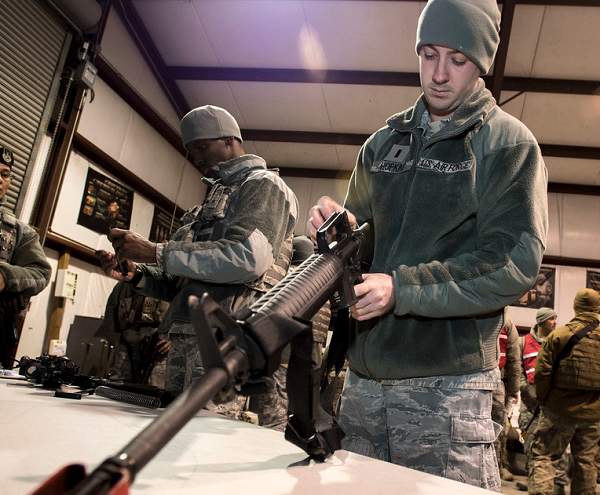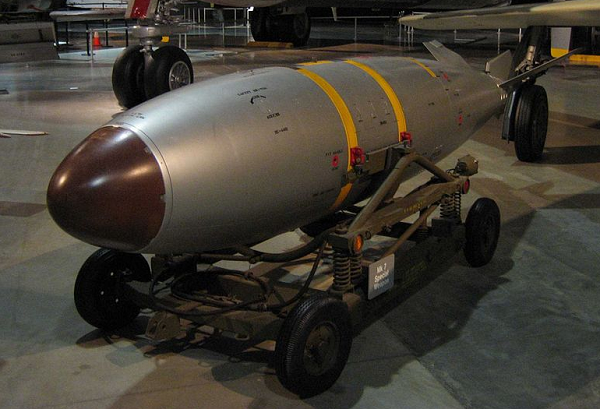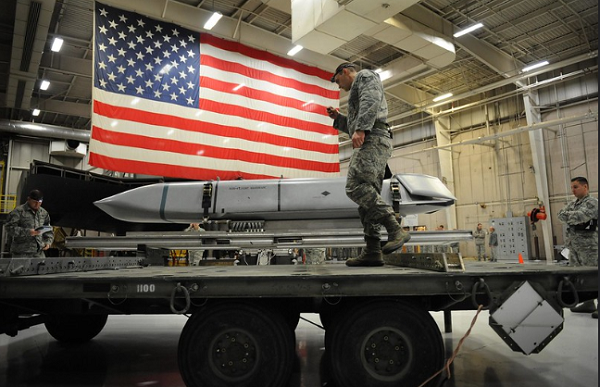Air Force Nuclear Weapons (2W2X1) specialist inspect, store and repair nuclear weapons and associated equipment.
These specialist ensure that the nuclear weapons remain safe, stable and secure.
They will comply with all nuclear safety measures when working with the weapons until the weapons are needed for national defense.
Education, Qualifications and Training
This Air Force position required top-level security clearance.
Needing security clearance generally means that you cannot enter into this position unless you are a U.S. Citizen and extra qualifications are required.
Related Article – How to Join the US Military as a Non-Citizen
Education
To enter into the Nuclear Weapons position in the Air Force individuals must have at minimum a High School Diploma or GED.
They will also be required to pass and take the Mechanical ASVAB test.
Qualifications
As previously mentioned, due to the nature of the job, this position has a few more requirements than other entry-level Air Force positions.
Nuclear Weapons qualifications include:
- Normal color vision and depth perception
- Knowledge of electrical and mechanical principles
- Valid driver’s license with ability to operate government motor vehicles
- Screened for eligibility and meet requirements for the Personnel Reliability Program (PRP)
- No record of emotional instability
- Complete a current Single Scope Background Investigation (SSBI)
- Be between the ages of 17 and 39
Training
After passing all background, physical and medical clearances, recruits will attend 8.5 weeks of Basic Military Training.
Technical training will be completed at Sheppard Air Force Base in Texas for 67 days.
Air Force Nuclear Weapons Job Duties

Nuclear Weapons specialist tasks include inspecting, assembling, disassembling, maintaining, repairing, refinishing, modifying and testing.
The items that they complete the above tasks for include: nuclear warheads, bombs, missiles, reentry vehicles and systems and any associated equipment.
These individuals store, handle and transport nuclear warheads, missiles, bombs, penetration aids, reentry vehicles and systems and associated equipment.
They will inspect, maintain and operate the vehicles and munitions material handling equipment that specialist use to transport and handle the nuclear weapons/equipment.
Specialist assist in performing operational checks on alarm systems.
As part of the alarm system testing, they will develop rotation schedules for high-security locks and keys.
Specialist ensure all parts and components are tested regularly.
They will update any parts or components that may be outdated or have other potential issues.
Any maintenance actions for nuclear weapons and related components will be planned, scheduled, inspected and evaluated by Nuclear Weapons specialist.
Specialist also plan, schedule, inspect and evaluate specialized test equipment and handling equipment.
They will resolve any maintenance issues that have been found from the above actions.
Maintenance that is performed will need to be reported by the specialist along with weapons inventory, accountability and verification procedures.
The Defense Integration and Management of Nuclear Data Services system will be used to perform all reporting.
The specialist will submit deficiency reports on any faulty components.
Nuclear Weapons specialist interpret publications as well as write, review and recommend improvements for technical data and equipment.
They will establish production control, performance standards and priorities for maintenance.
Often they will coordinate the maintenance actions with other organizations.
Specialist work within nuclear, missile, explosive and general safety measure compliance.
They follow all safety rules and technical orders.
They may have to perform disablement or evacuations of nuclear weapons.
In accordance with the North Atlantic Treaty Organization (NATO) custodial attachment, Nuclear Weapons specialist will perform escort duties and limited conventional munitions functions.
In addition to maintaining nuclear weapons, Nuclear Weapons specialist also store, maintain, inspect and use small arms and ammunition.
Related Article – Army MOS List: A List Of All 159 Army Jobs
What does an Air Force Nuclear Weapons specialist get paid?
Your pay in the Air Force is dependent on your rank and time in service.
There are varying ways to increase your rank including having a college degree.
This position is not an Officer position and can follow the base pay table found below.
| Insignia | Pay Grade | Rank | Abbreviation | 2023 Minimum Monthly Pay |
|---|---|---|---|---|
| E-1 +4 months | Airman Basic | AB | $1,917.60 | |
| E-2 | Airman | Amn | $2,149.20 | |
| E-3 | Airman First Class | A1C | $2,259.90 | |
| E-4 | Senior Airman | SrA | $2,503.50 | |
| E-5 | Staff Sergeant | SSgt | $2,730.30 | |
| E-6 | Technical Sergeant | TSgt | $2,980.50 | |
| E-7 | Master Sergeant | MSgt | $3,445.80 | |
| E-8 | Senior Master Sergeant | SMSgt | $4,957.20 | |
| E-9 | Chief Master Sergeant | CMSgt | $6,055.50 | |
| E-9 | Command Chief Master Sergeant | CCM | $6,055.50 | |
| E-9 | Chief Master Sergeant Of The Air Force | CMSAF | $6,055.50 |
Benefits

The Air Force offers benefits that help offset your housing cost, your food cost and other health costs.
Most benefits are offered to airmen for free or for very low cost compared to civilian jobs.
Individuals in the Air Force are offered:
- Housing: Allowance that is based on location and family status (dependents)
- Food: Allowance that is also based on location and family status and can be used for the on-base dining hall; access to tax-free grocery stores
- Insurance: Medical and dental, low cost life insurance, paid sick time
- Retirement: Available on day one of retirement after 20 years of service at no cost
- Vacation: 30 days paid vacation
- Education: Tuition assistance programs and scholarship opportunities
- Recreation: On-base recreational activities, social events and youth programming
Follow this link to find more information on benefits and pay or this link for more information on education tuition assistance and scholarships.
Related Article – Air Force Geospatial Intelligence (1N131): Career Profile
Job Reviews
Working as a Nuclear Weapons specialist means you get to work on top-secret equipment every day.
The work can be demanding and the hours can be long.
This position is one that you can progress quickly in, if you put in the hard work.
Airmen tend to like the work that they do and find it very engaging.
You can view the video below for a first-hand interview from a Nuclear Weapons specialist.
Civilian Career Opportunities
Individuals who work as a Nuclear Weapons specialist are not going to easily find a position that has the same job functions or tasks that they complete daily in the Air Force.
However, you can find positions that relate to some of the job duties including hazardous transport, maintenance planning, inventory control and maintenance functions.
You can also find nuclear jobs that do not necessary reference weapons.
Some jobs that relate to the above duties include:
- Hazardous Cargo Material Handling Supervisor
- Armed Nuclear Security Officer
- Nuclear Purchasing Specialist
- Nuclear Quality Control Inspector
- Maintenance Technician (firearms)
Related Article: Marine Machine Gunner (MOS 0331): Job Description And Summary
Summary
Air Force Nuclear Weapons specialist are responsible for inspecting, repairing and maintaining nuclear weapons.
They complete all maintenance and documentation on the safe storage and transport of nuclear weapons and any associated equipment.
This position requires top-level security clearance and requires individuals to meet high qualification and testing requirements.
Individuals can follow the enlisted pay table for pay information based on rank and time of service.
All individuals in this position will have access to Air Force benefits.
It can be hard to find a nuclear weapons position in the civilian world, but individuals can find positions that are similar to some of the job functions they perform on a daily basis.
Reference:
- 5 Worst Jobs in the Air Force - June 20, 2024
- 4 Steps For Visiting An Air Force Recruiter Near You - June 19, 2024
- Air Force Safety Specialist (1S0X1) - June 19, 2024

